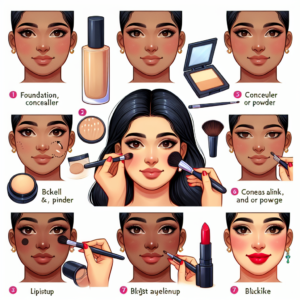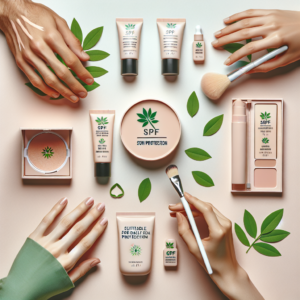
Key Takeaways
-
Vegan makeup is defined by its lack of animal by-products, whereas traditional makeup may contain ingredients like beeswax or carmine.
-
Ingredients in vegan makeup often include plant-based alternatives, while traditional makeup can have synthetic chemicals and animal-derived substances.
-
Vegan makeup is known for being kind to sensitive skin and the environment, while some traditional makeup can cause skin irritation or environmental harm.
-
Understanding labels is crucial; look for certifications from organizations like Vegan Action, Vegan Society, or PETA to ensure products are truly vegan.
-
Choosing between vegan and traditional makeup often comes down to personal ethics, skin sensitivity, and environmental concerns.
Decoding the Labels: Vegan and Traditional Makeup
When you’re standing in the beauty aisle, your eyes might dart from one product to another, each promising a radiant complexion and a guilt-free conscience. But how do you decide between a vegan foundation and a traditional one? Let’s dive into the labels and uncover what truly sets these two apart.
Defining Vegan Makeup
Vegan makeup is not just a trend; it’s a commitment to beauty without cruelty. What makes a product vegan is simple: it contains zero animal by-products. That means no honey, beeswax, lanolin, carmine, cholesterol, or gelatin. Instead, vegan cosmetics rely on plant-based or synthetic alternatives that mimic the properties of traditional ingredients. This switch is not only ethical but often results in products that are just as effective and luxurious.
What’s in Traditional Makeup?
Traditional makeup, on the other hand, has a more varied ingredient list. It may include animal-derived substances like beeswax for texture or carmine for red pigment. Besides that, traditional makeup can also contain synthetic chemicals that aren’t found in nature. While these ingredients have been the backbone of the cosmetics industry for years, they are increasingly scrutinized for their environmental impact and potential health effects.
The Ingredients Tell the Story
Vegan Makeup Composition
Let’s get to the heart of vegan makeup – the ingredients. Plant oils, waxes, and extracts are the stars here. Think of coconut oil for hydration, candelilla wax for structure, and fruit pigments for color. These ingredients are not only kind to your skin but also to our animal friends and the planet. And, because they are free from animal by-products, they are often suitable for people with sensitive skin or allergies.
Common Ingredients in Traditional Makeup
In contrast, traditional makeup may include a mix of animal-derived and synthetic ingredients. Some common ones are:
-
Beeswax: Used as a thickener and emulsifier.
-
Lanolin: Derived from sheep’s wool and used for its moisturizing properties.
-
Carmine: A red dye made from crushed cochineal insects.
-
Parabens: Synthetic preservatives that have raised health concerns.
While these ingredients have been trusted for years, the shift towards more natural and ethical alternatives is growing.
Understanding Labels: Spotting Animal By-products
Reading labels is an art in itself. To spot animal by-products, you need to look beyond the ‘vegan’ label. Certifications from Vegan Action, Vegan Society, or PETA are good indicators, but it’s also wise to familiarize yourself with ingredient names. Carmine, for example, might be listed as CI 75470, while lanolin could be hidden as wool wax or wool grease. By learning these terms, you become a more informed and conscious consumer.

Performance on the Skin
When it comes to how makeup feels and behaves on your skin, there’s a lot to consider. Vegan makeup often takes the spotlight for its gentle touch. Many users report less irritation and breakouts because plant-based ingredients are typically more harmonious with our skin’s natural biology. Vegan formulas often skip harsh chemicals, opting for soothing elements like aloe vera and shea butter instead.
How Vegan Makeup Measures Up
Vegan makeup isn’t just about what’s not in it; it’s about what it can do for your skin. High-quality vegan makeup provides excellent coverage, a wide range of shades, and long-lasting wear. Plus, innovations in vegan beauty have led to products that are rich in antioxidants and vitamins, offering skincare benefits alongside aesthetic enhancement. For instance, you might find a vegan lipstick that also nourishes your lips with vitamin E and jojoba oil.
Traditional Makeup: Potential Pitfalls
Traditional makeup, while effective, can sometimes be a double-edged sword. Some ingredients, like synthetic fragrances or preservatives, can cause skin irritation or allergic reactions. Additionally, heavier formulations may clog pores, leading to acne. Therefore, it’s important to know your skin type and any sensitivities when choosing traditional makeup products.
Environmental and Ethical Impact
The beauty industry’s impact on our planet is as significant as the effect of its products on our skin. Vegan makeup often leads the way in sustainability, with brands focusing on eco-friendly packaging and responsible sourcing of ingredients. This mindful approach appeals to those who want their beauty routine to reflect their values.
The Eco-friendly Approach of Vegan Makeup
Vegan makeup brands tend to prioritize sustainability, not just in their formulas but in their entire production process. They often use recyclable packaging and may support organic farming, which is better for wildlife and the environment. Moreover, plant-based ingredients generally require fewer resources to produce than animal-derived substances, resulting in a lower carbon footprint.
Cruelty-Free: More Than Just a Label
Cruelty-free is a term that goes hand-in-hand with vegan makeup. It means that the product and its ingredients were not tested on animals. This ethical stance is crucial for many consumers. However, it’s important to note that not all cruelty-free products are vegan, so checking for both certifications is key if you want to ensure no animals were harmed or used in any stage of the product’s development.
Paving the Way Forward
The beauty industry is ever-evolving, with vegan makeup leading a revolution of sorts. As we become more aware of the ingredients we’re putting on our skin and their broader implications, the demand for transparent, ethical, and sustainable products grows. Embracing vegan makeup is more than a personal choice; it’s a step towards a kinder beauty industry.
Embracing Innovation in Vegan Beauty
Technological advancements have propelled vegan beauty into the future. Brands are now creating products that rival traditional makeup in performance and aesthetic. Vegan mascaras that provide dramatic volume without beeswax, and foundations that offer full coverage without animal-derived stearic acid, are just a couple of examples of how innovation is driving vegan beauty forward.
Making Informed Choices as a Consumer
As a consumer, you have the power to influence the industry with your choices. By opting for vegan and cruelty-free products, you’re supporting a movement that values ethical practices and environmental stewardship. Always research your products, understand the labels, and choose brands that align with your values. In doing so, you help pave the way for a future where beauty is synonymous with kindness.
Frequently Asked Questions (FAQ)
Is Vegan Makeup As Effective As Traditional Makeup?
Yes, vegan makeup can be just as effective as traditional makeup. Thanks to advancements in beauty technology, vegan products offer excellent coverage, durability, and a rich palette of colors. High-performance vegan makeup is designed to meet the same standards as traditional options, ensuring you don’t have to compromise on quality for ethical preferences.
Can Vegan Makeup Provide the Same Variety in Shades?
Indeed, the variety of shades available in vegan makeup has expanded significantly. Brands are increasingly attentive to diverse consumer needs, offering a spectrum of shades for all skin tones. From foundations to eyeshadows, vegan makeup lines are proving that variety and inclusivity can be achieved without animal by-products.
-
Vegan foundations now come in a range of shades suitable for every skin tone.
-
Eyeshadow palettes offer a multitude of colors, from subtle nudes to vibrant hues.
-
Lip products are available in mattes, shimmers, and glosses to cater to every preference.
With this variety, you’re sure to find vegan makeup products that match your skin tone and style perfectly.
How Can I Tell If a Product Is Truly Vegan?
To ensure a product is truly vegan, start by looking for certifications from reputable organizations like Vegan Action, the Vegan Society, or PETA. These certifications indicate that the product meets strict vegan standards. Additionally, familiarize yourself with common animal-derived ingredients and their alternatives so you can identify them on ingredient lists.
Example: A vegan lipstick will not contain beeswax (commonly listed as cera alba) or carmine (CI 75470), but may use plant waxes and natural pigments instead.
By being vigilant and informed, you can confidently choose genuine vegan products.
Why Might Someone Choose Vegan Makeup Over Traditional Makeup?
There are several compelling reasons to choose vegan makeup over traditional makeup:
-
Ethical concerns: Vegan makeup ensures that no animals were harmed or used in the production process.
-
Skin sensitivities: Vegan products often omit harsh chemicals and allergens, making them suitable for sensitive skin.
-
Environmental impact: Plant-based ingredients and eco-friendly packaging make vegan makeup a more sustainable choice.
-
Health considerations: Some prefer vegan makeup to avoid exposure to certain synthetic ingredients found in traditional makeup.
These factors make vegan makeup an attractive choice for many conscious consumers.
Are There Any Known Allergens in Vegan Makeup?
While vegan makeup is often suitable for sensitive skin, it’s not completely free of allergens. Some individuals may be allergic to natural ingredients like nuts or soy, which can be found in vegan products. It’s always important to check the ingredient list and patch test new products, regardless of whether they are vegan or traditional.
Remember, everyone’s skin is unique, and what works for one person may not work for another. Therefore, always approach new makeup with mindfulness and care.
In conclusion, the world of makeup is vast and varied, with vegan and traditional options offering their own unique benefits. As you navigate your beauty journey, remember that the power of choice lies in your hands. By educating yourself on the differences and making informed decisions, you can embrace beauty products that align with your values, enhance your natural beauty, and contribute to a kinder world.




